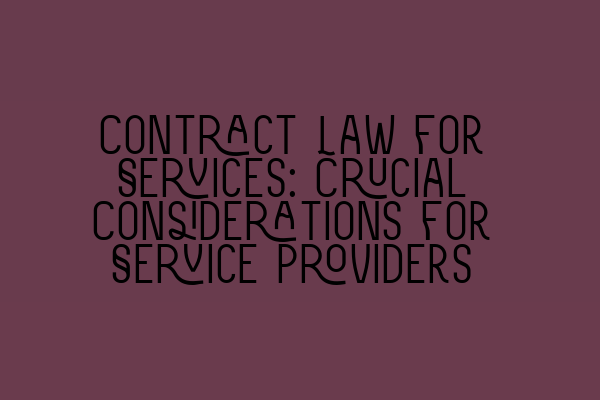Contract Law for Services: Crucial Considerations for Service Providers
As a service provider, understanding contract law is essential to protect your rights and interests. Contracts govern the relationships between service providers and their clients, outlining the obligations, expectations, and terms of the services being provided. In this article, we will cover some crucial considerations for service providers when it comes to contract law.
1. Clear and Comprehensive Contracts
A well-drafted contract is the foundation of a successful service provider-client relationship. It is imperative to clearly outline the scope of services, pricing, timelines, deliverables, and any specific terms that may apply. By laying out all the agreed-upon terms in a comprehensive manner, both parties can avoid misunderstandings or potential disputes in the future.
When drafting your contract, make sure to use clear and unambiguous language. Avoid technical jargon that could confuse the client. Provide definitions for any specialized terms used within the contract. Remember, clarity is key.
2. Terms and Conditions
In addition to the main body of the contract, it is essential to include a section with terms and conditions that govern the overall relationship between the service provider and the client. This section should cover areas such as termination, dispute resolution, intellectual property rights, confidentiality, and liability limitations.
Clearly defining these terms and conditions will set expectations and reduce the risk of disputes down the line. It is also advisable to consult with a legal professional to ensure that your terms and conditions are in compliance with applicable laws and regulations.
3. Payment and Pricing
One of the most crucial aspects of a service contract is the payment and pricing terms. Clearly outline the pricing structure, including any upfront or installment payments and the consequences of late or non-payment. Specify the preferred payment methods and invoicing procedures to avoid any confusion or delays in receiving payment for your services.
It is also advisable to include provisions for fee adjustments, should there be any changes in the scope of work or unforeseen circumstances that may require additional effort from the service provider. By addressing payment terms upfront in the contract, you can maintain a healthy working relationship with your clients.
4. Intellectual Property Rights
Intellectual property rights are often a crucial concern for service providers, especially in creative industries. Clearly specify who will own the intellectual property rights to any work produced during the course of the project. Consider including provisions that allow you to use samples of your work for promotional purposes, subject to client approval.
If necessary, consult with an intellectual property lawyer to ensure that you protect your rights adequately and that your contract is in line with copyright and intellectual property laws.
5. Confidentiality and Non-Disclosure
Many service providers work with sensitive information and trade secrets. To safeguard your client’s interests and maintain trust, include confidentiality and non-disclosure provisions in your contract. These provisions should clearly define what constitutes confidential information and outline the steps you will take to protect that information.
Additionally, consider including a non-compete clause that restricts you from providing similar services to competitors of your client for a specified period after the project ends.
6. Termination and Dispute Resolution
No matter how well you plan, disputes may still arise. Clearly outline the procedures for dispute resolution and the steps that should be taken before resorting to litigation. Consider including a mediation or arbitration clause to encourage a peaceful resolution of any conflicts that may arise.
Similarly, include provisions for termination of the contract. Outline the circumstances that may lead to termination and the notice period required. By setting out these terms in advance, you can protect yourself from unexpected terminations and ensure a smooth transition if the contract needs to be terminated.
Final Thoughts
Getting your contracts right is an essential part of being a successful service provider. By incorporating the crucial considerations discussed in this article and consulting with a legal professional, you can ensure that your contracts provide the necessary protection and clarity to both you and your clients.
For more information on contract law and other legal topics, check out the following related articles:
